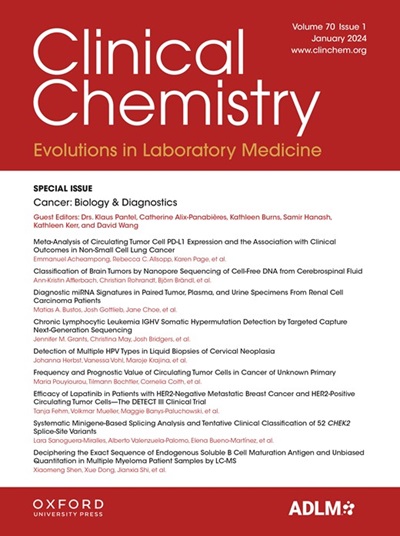新型FAS内含子和剪接区VUS的B-252功能验证
IF 6.3
2区 医学
Q1 MEDICAL LABORATORY TECHNOLOGY
引用次数: 0
摘要
自身免疫性淋巴细胞增生性综合征(ALPS)是一种罕见的遗传性疾病,以慢性淋巴结病变、脾肿大、细胞减少和淋巴瘤风险增加为特征。分子遗传学诊断对于准确诊断和治疗ALPS至关重要,特别是由于其与自身免疫性淋巴增殖性免疫缺陷(ALPID)重叠的临床特征。大约80%的ALPS病例是由FAS (ALPS-FAS, ALPS- sfas)的种系或体细胞致病变异引起的,主要是显性负干扰或单倍功能不全。FAS突变谱包括无义型、移码型、错义型、剪接缺陷型和拷贝数型。值得注意的是,大约13%的ALPS-FAS病例归因于FAS剪接位点/区域突变,这种突变破坏了剪接。然而,由于缺乏功能验证,新的剪接区或深内含子FAS变异常被归类为未知意义变异(VUS),难以确定其精确分类。本研究旨在鉴定和表征在儿科中心的1488例ALPS病例中发现的新型内含子或剪接区FAS VUS,以及在ClinVar数据库中报告的病例。方法回顾性分析我院2005年至2023年间FAS基因测序或ALPS下一代测序(NGS)的1488例疑似ALPS患者的记录。发现了以前未报道的具有潜在剪接作用的变异。此外,我们回顾了ClinVar数据库中具有预测剪接影响的罕见FAS变异。为了从功能上评估这些变异,我们计划使用一种迷你基因试验,其中包括将包含感兴趣的外显子及其侧翼内含子的基因的简化版本构建到质粒中。然后将该质粒转染到细胞中,以分析该变体如何影响产生的mRNA转录物。结果我们从我们的队列中鉴定了19个新的FAS变体,在30个独立先证中预测了剪接效应。这些变异分布在8个FAS内含子剪接区域,包括一个深外显子区域的同义变化,预计会激活附近的隐剪接供体。此外,对ClinVar数据库的回顾揭示了19个以前未报道的FAS罕见剪接区域变异,其中13个被预测会影响剪接。我们将使用minigene系统来实验验证这些变异的功能后果。结论影响剪接的FAS致病变异是ALP-FAS和ALP-sFAS发病的重要因素。minigene检测将提供关键的功能证据,进一步表征罕见VUS的致病性,并预测剪接效应,从而提高对ALPS的分子诊断。当无法获得受影响患者的RNA样本时,这种方法尤其有价值,可以对ALPS进行更全面的遗传评估。本文章由计算机程序翻译,如有差异,请以英文原文为准。
B-252 Functional Validation of Novel FAS Intronic and Splice Region VUS Through Minigene Assays
Background Autoimmune lymphoproliferative syndrome (ALPS) is a rare genetic disorder characterized by chronic lymphadenopathy, splenomegaly, cytopenias, and an increased risk of lymphoma. Molecular genetic diagnosis is essential for the accurate diagnosis and management of ALPS, particularly due to its overlapping clinical features with autoimmune lymphoproliferative immunodeficiency (ALPID). About 80% of ALPS cases result from germline or somatic pathogenic variants in FAS (ALPS-FAS, ALPS-sFAS), primarily through dominant-negative interference or haploinsufficiency. The FAS mutation spectrum includes nonsense, frameshift, missense, splicing defect variants, and copy number variants. Notably, around 13% ALPS-FAS cases are attributed to splice site/region mutations in FAS that disrupt splicing. However, novel splice region or deep intronic FAS variants are often classified as variants of unknown significance (VUS) due to the lack of functional validation, making their precise classification difficult to determine. This study aims to identify and characterize novel intronic or splice region FAS VUS found in a cohort of 1,488 ALPS cases at a pediatric center, as well as those reported in the ClinVar database. Methods We retrospectively reviewed the records of 1,488 patients with suspected ALPS referred to our institution for either the FAS gene sequencing or ALPS next-generation sequencing (NGS) panel between 2005 and 2023. Previously unreported variants with potential splicing effect were identified. Additionally, we reviewed the ClinVar database for rare FAS variants with predicted effects on splicing. To functionally assess these variants, we plan to use a minigene assay, which involves constructing a simplified version of the gene containing the exon of interest and its flanking introns into a plasmid. This plasmid is then transfected into cells to analyze how the variant affects the resulting mRNA transcript. Results We identified 19 novel FAS variants with predicted splicing effect in 30 independent probands from our cohort. These variants were distributed across eight FAS intronic splicing regions, including one synonymous change in a deep exonic region predicted to activate a nearby cryptic splice donor. Additionally, a review of the ClinVar database revealed 19 previously unreported rare splice region variants in FAS, of which, 13 were predicted to affect splicing. We will use the minigene system to experimentally validate the functional consequences of these variants. Conclusion FAS pathogenic variants affecting splicing represent a significant contributor to ALP-FAS and ALP-sFAS. The minigene assay will provide crucial functional evidence to further characterize the pathogenicity of rare VUS with predicted splicing effects, thereby improving the molecular diagnosis for ALPS. This approach is particularly valuable when RNA samples are unavailable from affected patients, enabling a more comprehensive genetic evaluation of ALPS.
求助全文
通过发布文献求助,成功后即可免费获取论文全文。
去求助
来源期刊

Clinical chemistry
医学-医学实验技术
CiteScore
11.30
自引率
4.30%
发文量
212
审稿时长
1.7 months
期刊介绍:
Clinical Chemistry is a peer-reviewed scientific journal that is the premier publication for the science and practice of clinical laboratory medicine. It was established in 1955 and is associated with the Association for Diagnostics & Laboratory Medicine (ADLM).
The journal focuses on laboratory diagnosis and management of patients, and has expanded to include other clinical laboratory disciplines such as genomics, hematology, microbiology, and toxicology. It also publishes articles relevant to clinical specialties including cardiology, endocrinology, gastroenterology, genetics, immunology, infectious diseases, maternal-fetal medicine, neurology, nutrition, oncology, and pediatrics.
In addition to original research, editorials, and reviews, Clinical Chemistry features recurring sections such as clinical case studies, perspectives, podcasts, and Q&A articles. It has the highest impact factor among journals of clinical chemistry, laboratory medicine, pathology, analytical chemistry, transfusion medicine, and clinical microbiology.
The journal is indexed in databases such as MEDLINE and Web of Science.
 求助内容:
求助内容: 应助结果提醒方式:
应助结果提醒方式:


